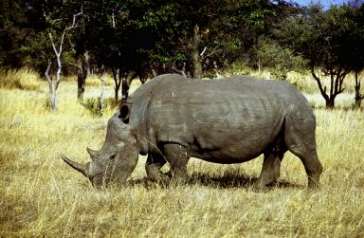Human activities and the savanna biome
Many animals of the savanna biome like the rhinoceros are endangered and threatened with extinction due to hunting and habitat loss. Most species of elephants are in danger of extinction due to poaching for their ivory tusks. Several means to protect these animals have been tried, even removal of the rhinoceros's horns and the elephant's tusks. Many countries have banned the sale of ivory to discourage poaching under the Convention on International Trade in Endangered Species (Cites) in 1989. The stronger enforcement against poaching nearly brought it to a halt.
 Figure 13.19
Square lipped rhinoceros, Zambia.
Figure 13.19
Square lipped rhinoceros, Zambia.
Source: M.Boulton,
FAO. Used with
permission)
The success of the ban encouraged some countries to negotiate its lifting to sell stockpiled ivory from seizures. A significant increase in elephant poaching has resulted from a substantial rise in the value of ivory. A 2008 research report indicated that African elephant death rate from poaching was at 8 per cent, higher than the 7.4 per cent rate that led to the international ban on ivory trade. African elephant population was estimated at 1 million, with about 70,000 elephants killed each year. In 2008, the population was less than 470,000. At this rate, it is estimated that African elephants could be extinct by 2020. A significant demand in rhino horn as sparked and increase in rhino poaching. In this NPR All Things Considered story from May 13, 2013, Frank Langfett describes how ![]() "Vietnam's Appetite for Rhino Horn Drives Poaching in Aftica". The NPR Morning
Edition segment
"Vietnam's Appetite for Rhino Horn Drives Poaching in Aftica". The NPR Morning
Edition segment ![]() "Radiocarbon Clues Help Track Down Poached Elephant Ivory" from July 2, 2013 looks out how conservation scientists use high tech means to uncover the source of poached ivory.
"Radiocarbon Clues Help Track Down Poached Elephant Ivory" from July 2, 2013 looks out how conservation scientists use high tech means to uncover the source of poached ivory.
Watch Biomes: Savanna
Courtesy Great Pacific Media